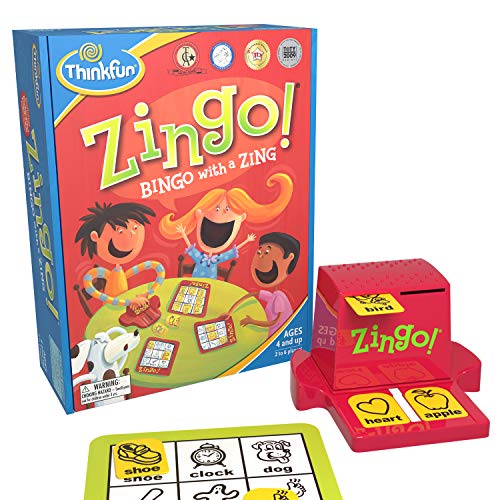Building Language Skills: 7 Vocabulary Games for Preschoolers
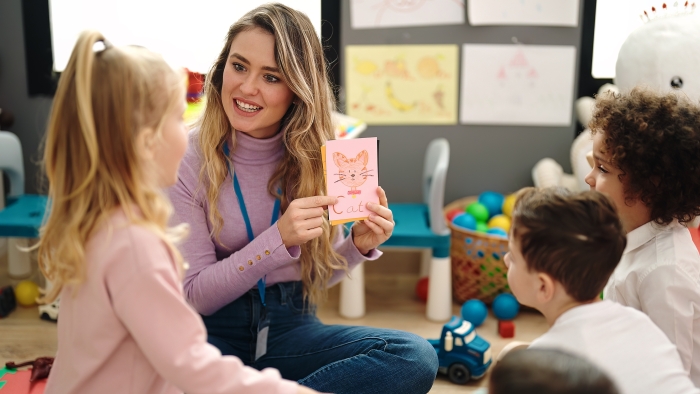
This post may contain affiliate links; please see our terms of use for details.
- Games for vocabulary help increase a child’s word bank while keeping them excited about learning.
- Parents and teachers should focus on creating a positive and supportive learning environment while providing opportunities for children to practice vocabulary.
- Vocabulary games for preschoolers help blend learning with play, allowing them to experiment, explore, and understand the world around them.
Preschoolers are like sponges when it comes to soaking up new information, including language. Since they’re at the age where their vocabulary is quickly expanding, it’s an excellent opportunity to foster language development through vocabulary games.
You can use everyday objects to work on vocabulary words, so running to the store and spending tons of money on these activities is unnecessary. With just a few items, teachers and parents can help motivate students with encouragement and positive reinforcement.
What I love about these vocabulary games is you can alter them as your child ages, ensuring they’re still grade-level appropriate. Not only do the games help develop a strong foundation for communication, but they also provide a fun and interactive learning experience.
Game 1: Picture Word Matching
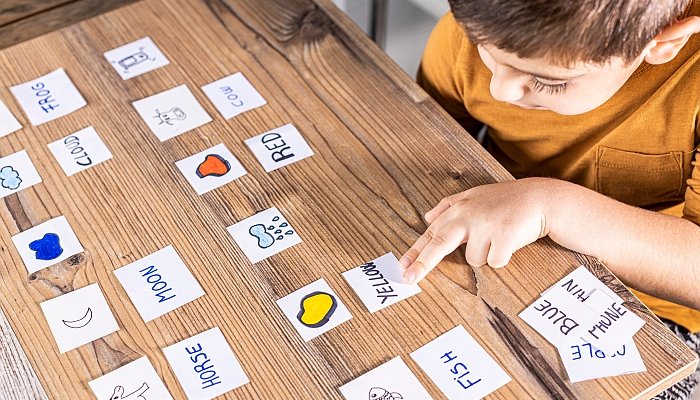
Picture Word Matching is one of the best language activities for toddlers that helps teach them new words. This game is excellent for helping increase vocabulary and improve word and picture association skills.
If your preschooler has issues with difficult words, set them aside for now and revisit them as they progress. It’s always a great idea to cheer them on when they learn a new word.
Remember, children don’t need words to learn vocabulary. Understanding what a picture means is an excellent way to learn a new vocabulary word or two.
You can also grab a piece of paper, have the child draw a picture, and explain what they drew. There’s no wrong way for a child to express their vocabulary through pictures. It’s an excellent way for preschoolers to use their imagination and improve their vocabulary.
Materials Needed
- Picture cards with images of everyday objects
- Word cards with the names of objects on the picture cards
How to Play
- Spread out picture cards face-up.
- Give the child a word card and ask them to match it with the corresponding picture.
- Engage in conversation about the object to enhance understanding.
Game 2: Story Cubes
- INSPIRE IMAGINATION: Unleash boundless creativity by combining items, characters, places, and animals to craft and share unique tales.
- ECO-FRIENDLY PACKAGING: Now in eco-conceived packaging without plastic, housed in a tin box for sustainable storytelling adventures.
- PORTABLE ENTERTAINMENT: Perfect for storytelling on the go – ideal for travel, school, camping, and restaurant waiting.
- MIX AND MATCH: Compatible with other themes, these cubes offer endless storytelling possibilities.
Story Cubes is an easy game to help enhance creative thinking in preschoolers and improve sentence construction. It’s one of the great games to encourage children to use their imagination and spark creativity.
Plus, this game doesn’t take more than five or ten minutes, and since you don’t have to use all the words, it’s easy to keep the child’s attention. Games like this are perfect for a restaurant or a rainy day at school.
Preschoolers use receptive language to understand information, and language games, like Story Cubes, help children develop the necessary skills for language development.
You can also reference related words to keep the game going, especially if they are eager after the first word.
If you’re in the classroom, another option is to have one student start the conversation while others chime in with their additions.
Materials Needed
- Dice with pictures on each face (or purchase a game like Rory’s Story Cubes)
- A timer (optional)
How to Play
- Roll the dice to reveal a set of pictures.
- Create a story including all the revealed pictures within a set time.
- Parents and teachers can participate in making complex stories.
Game 3: Alphabet Soup
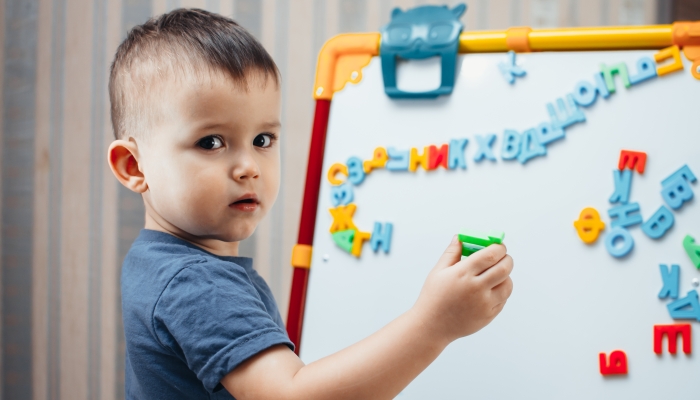
Kids can “fish” for letters in this fun game of Alphabet Soup, one of the best vocabulary games for preschoolers. The game helps children develop faster letter recognition and is a great way to introduce spelling and reading.
What’s excellent about Alphabet Soup is you don’t need many supplies and can play the game frequently while adding new words as your child progresses.
Language activities like this are a great way to see how many words a child can make from what they are given. You can make it a challenge amongst students, and the one with the most points wins.
The American Academy of Pediatrics11. Power of Play in Early Childhood. American Academy of Pediatrics. 2021. https://www.aap.org/en/patient-care/early-childhood/early-childhood-health-and-development/power-of-play (AAP) states that children learn new words by interacting with others and by repeated exposure to words in various settings. Alphabet Soup is an easy game, so bringing it to your next playgroup or introducing it in the classroom is a fantastic idea.
Materials Needed
- Magnetic letters or letter cards
- A bowl or a container
How to Play
- Place letters in a bowl.
- Have each child pick letters out of the bowl until they form a word.
- Assist and appreciate the effort of all the students to make learning positive.
Game 4: Sight Word Bingo
- Skill Level: Beginner
- Develops Critical Skills – Perfect For Pre-Readers And Early Readers, Builds Language And Matching Skills In Preschool Kids Through Fun, Fast-Paced Play Zingo Is As Popular In The Classroom With Teachers As It Is In The Home With Families
- What You Get – This Is The Newest Edition Of The World Famous Game Zingo, One Of Thinkfun’S Best Games For Kids Ages 4 And Up, And It Includes An Extra Zingo Card So That Up To 7 Players Can Play! Also Includes A Unique Zinger Device That Delights Players Of All Ages
- Clear Instructions – Easy To Learn With A Clear, High Quality Instruction Manual You Can Start Playing Right Away
Sight Word Bingo is a fun game perfect for a rainy day at home or in the classroom. Depending on the child, teachers or parents can have students match words or pictures of everyday objects.
Simple word games like vocabulary bingo help preschoolers recognize and identify words and pictures. It’s easy to make your own Bingo cards on the computer, but I’m also a big fan of the ThinkFun Zingo Bingo Preschool Game.
My kids have always loved Zingo, and it’s a great way to work on picture and word association. While the first person is usually the winner, I go a few rounds to ensure several kids can be the champ.
Materials Needed
- Printed Bingo sheets with various words or pictures
- Pieces of paper or tokens to place over called words or pictures
How to Play
- Pick words or pictures out of a bag and show the students to see if they have the same word.
- Have kids cover the words with a token or piece of paper as they’re called.
- When someone finishes a row, they call out “bingo.” Keep playing until the next student wins, too.
Game 5: Scrabble
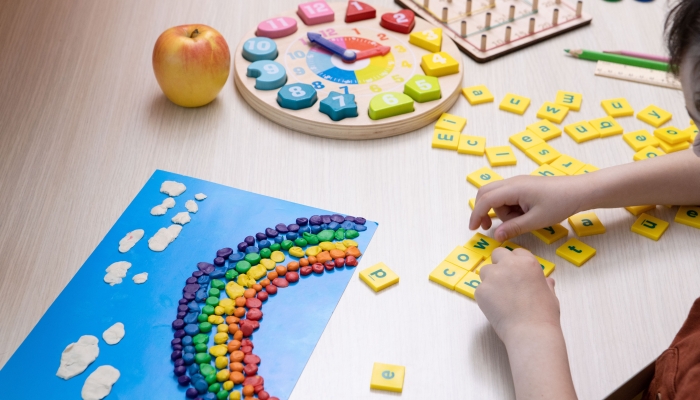
While the popular board game is likely too advanced for preschoolers, you can bend the rules to encourage your children to create words with the letters they have.
To help students understand better, you can use word lists to recreate with their tiles, which may help identify the correct word.
If you have a large class, you can have students play in small groups and have vocabulary checkers to ensure they help identify wrong answers. In the end, whatever team has the most words wins!
Scrabble is a great stepping stone to completing a crossword puzzle, which is a little complex for preschoolers.
Materials Needed
- Letter tiles
How to Play
- Distribute seven letter tiles to each student and work together to form words.
- You can play this game as a one-on-one activity or in partner groups.
- The game ends when the first student is out of tiles.
Game 6: Pictionary Junior
- The classic quick-draw game since 1985
- You don’t have to be an artist to play all you need is a little imagination!
- The guesses can be just as hilarious as the sketches!
- The kids’ version has hints and two levels of play
Another classic vocabulary game is Pictionary Junior, and while you can buy it at the store, you can also make your own version. You can play with one student or with a class, allowing everyone to participate.
The Mattel Games Junior Pictionary Game is great for encouraging creativity and aiding in vocabulary expansion to learn more words.
Pictionary also helps preschoolers associate pictures with the word visually, leading to a better retention of words. It’s also an enjoyable and easy way to work on grasping new, sometimes challenging words.
In addition, preschoolers can work on enhancing logical thinking skills and learn to communicate with their peers. Even if the children don’t guess the correct word, they work on several necessary life skills!
Materials
- Pictionary Junior cards
- Large drawing pad or whiteboard (if you’re making your own)
- Markers
- Timer (optional)
How to Play
- One player from each team picks a card and starts drawing the word without using any numbers or letters. (The teacher or parent may have to help children with the words.)
- Each team player guesses until the timer runs out.
- Switch to the next student and continue until every child has had a turn.
- The team with the most correct guesses wins the game!
Game 7: Sight Word Scavenger Hunt

Having a Sight Word Scavenger Hunt was a popular word game in my house during the pandemic. My oldest was in kindergarten and enjoyed the fun challenge, while I learned engaging in fun games was a good way for him to learn new words.
Scavenger hunts are a great way to engage students in learning new vocabulary words and help them identify words correctly as they navigate the hunt.
If you’re a teacher, you can divide students into two groups and have them play against other students. In addition, if your children aren’t ready to read the word correctly, you can also put pictures on the paper instead.
You can put two words on each piece of paper for more advanced students. You can also have the students write the words for additional help learning new words.
You can give one point for each found vocabulary word to keep the score. The winning team has the most points at the end of the game.
Materials
- Pieces of paper with sight words or pictures
How to Play
- Hide the sight word cards in a room or classroom.
- When a child finds one word, have them identify it on the paper.
Additional Tips for Parents and Teachers
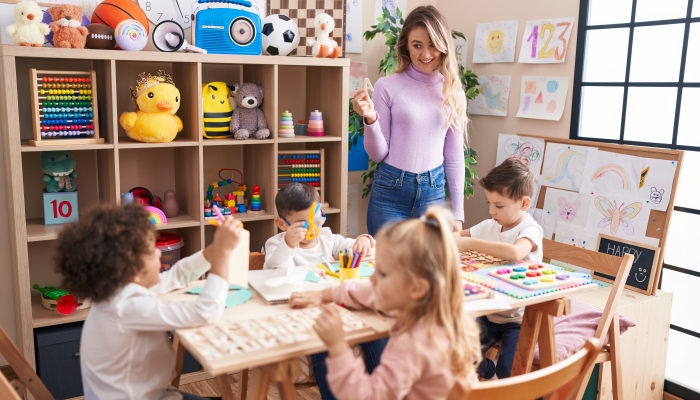
Learning new words doesn’t always come easy for kids, so it’s best to understand your child’s or student’s vocabulary skills.
Preschool literacy activities are meant to educate, but remember—word games should also be fun.
Here are a few tips as you introduce vocabulary games to your preschooler:
- Create a positive and encouraging learning environment.
- Make game play fun by providing positive reinforcement.
- Use word games as a fun way to encourage learning a new vocabulary word.
- Incorporate learning into daily activities by using everyday objects.
- Focus on interactive and engaging learning, including rhyming and storytelling games.
- Use age-appropriate vocabulary words and avoid complex vocabulary.
- Read picture books and point to and discuss objects and characters with your child.
- Find vocabulary games to play online, like ABC Mouse or PBS Kids.
- Add new words each week as your child progresses.
A 2016 study by Hassinger-Das et al., published in the journal Mind, Brain, and Education, found that combining vocabulary gameplay with shared book reading improved children’s learning of vocabulary words22. Hassinger‐Das, B., Ridge, K., Parker, A., Golinkoff, R. M., Hirsh‐Pasek, K., & Dickinson, D. K.. Building Vocabulary Knowledge in Preschoolers Through Shared Book Reading and Gameplay. Mind, Brain, and Education. 2016;10(2), 71–80. https://doi.org/10.1111/mbe.12103.
FAQs
What age is appropriate to start vocabulary games for kids?
Most children will be ready for vocabulary games between 1–3 years old. However, you can lay the foundation with your infant by talking and reading to them from birth.
You can narrate daily activities, maintain eye contact, and use simple words to help your child absorb language from an early age.
What are the benefits of interactive vocabulary games for children?
There are many benefits of interactive vocabulary games for children, including:
- Social interaction
- Active learning
- Enhanced vocabulary
- Improved retention and memory
- Development of problem-solving skills
- Fostering critical thinking
Remember, every child is different, and paths to vocabulary development differ, too.
How much time should preschoolers spend on vocabulary games daily?
Your time spent on vocabulary games with your preschooler will depend on their age and attention span.
Since younger children have shorter attention spans, you can focus on quick and frequent sessions, like 10–15 minutes.
You can gradually increase the time as your child ages and their attention span improves.
How can parents measure their kid’s progress in language skills through vocabulary games?
You can record and document your child’s progress in language skills so you are familiar with their pace. You can also observe them in everyday conservations to see how they use new vocabulary words in context.
If your child is in school, you can discuss their progress with the teacher and determine where they excel and which areas need work.
Classroom vocabulary games are an excellent way for a child to enhance their vocabulary if it’s age-appropriate.
References
- Power of Play in Early Childhood. American Academy of Pediatrics. (2021, December 21). https://www.aap.org/en/patient-care/early-childhood/early-childhood-health-and-development/power-of-play
- Hassinger‐Das, B., Ridge, K., Parker, A., Golinkoff, R. M., Hirsh‐Pasek, K., & Dickinson, D. K. (2016). Building Vocabulary Knowledge in Preschoolers Through Shared Book Reading and Gameplay. Mind, Brain, and Education, 10(2), 71–80. https://doi.org/10.1111/mbe.12103
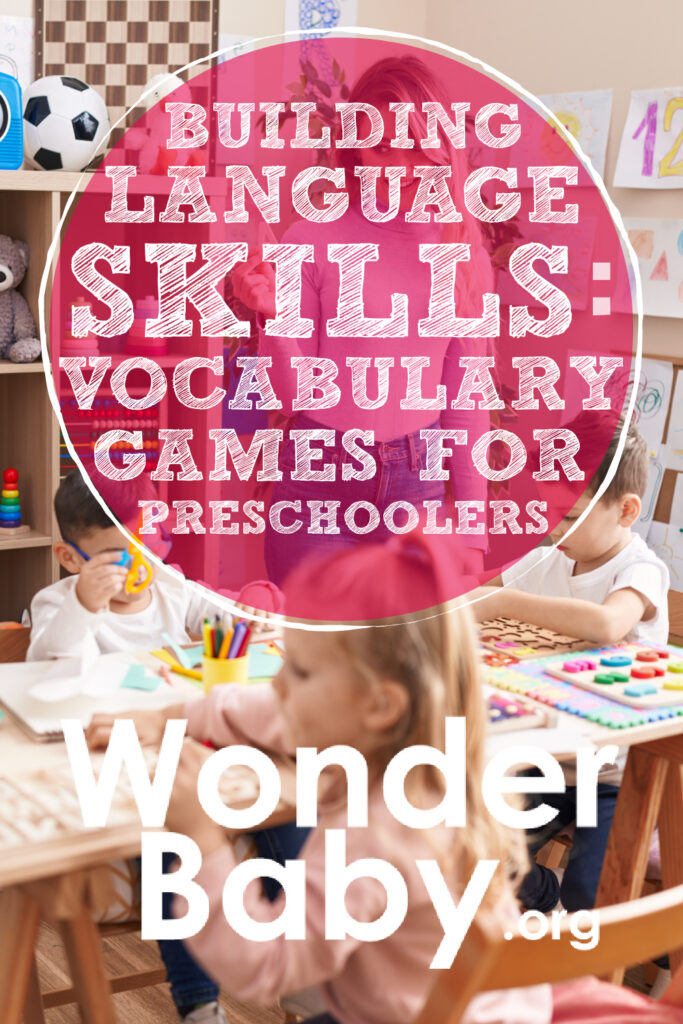
Related Posts
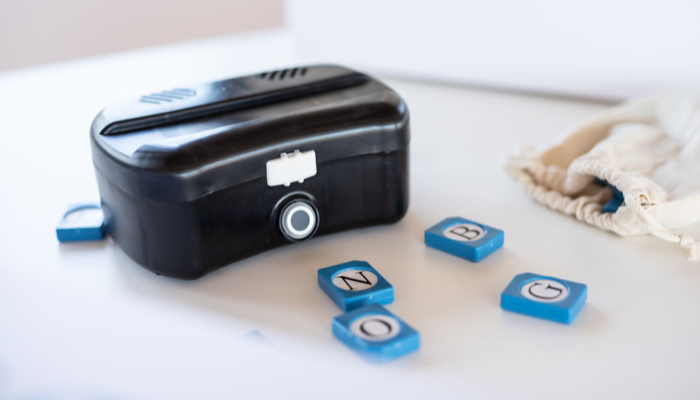
Braille and Literacy
Making Braille Fun: Introducing Handi Exceller’s Innovative Learning Tools for Blind Students
Handi Exceller was born from a simple idea: learning braille should be both fun and accessible. The company creates interactive and gamified ways to teach braille.
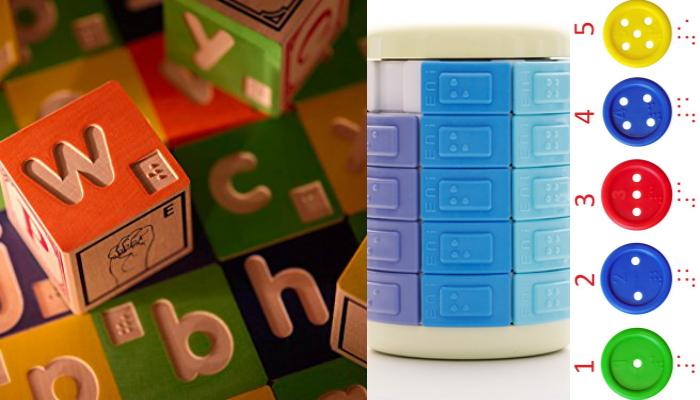
Braille and Literacy, Toys, Visual Impairment
24 Braille Toys for Kids Who are Blind
Everything from alphabet blocks to raised line coloring pages and activity books to puzzles to card and board games... and so much more! And it's all in braille ready for...
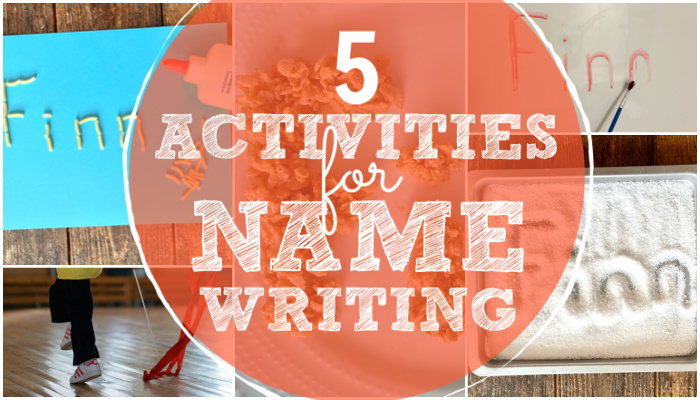
Braille and Literacy
5 Activities for Name-Writing
Learning to write your name is an important preschool skill. Make the task fun with one of these 5 activities for name-writing!

